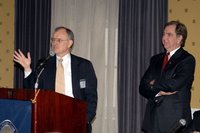Reported originally in Meridian Magazine
 Associate General Counsel of the Church specializing in international affairs, William F. Atkin told about a visit he made to the Holocaust Museum in Washington D.C. It was a quiet day, with few people, and as he saw the gruesome story spelled out in such graphic detail, he began to feel a heaviness. It was unrelenting until he got to one of the last exhibits which told the stories of the rescuers, who though not Jewish themselves, had taken individual risk to save and shelter the persecuted people.
Associate General Counsel of the Church specializing in international affairs, William F. Atkin told about a visit he made to the Holocaust Museum in Washington D.C. It was a quiet day, with few people, and as he saw the gruesome story spelled out in such graphic detail, he began to feel a heaviness. It was unrelenting until he got to one of the last exhibits which told the stories of the rescuers, who though not Jewish themselves, had taken individual risk to save and shelter the persecuted people.
Researchers, he explained, had interviewed the rescuers to try to determine what distinguished them from the bystanders who had merely stood by. What was there about those individuals who risked their own lives to save another?
The most marked thing was that they had a personality type-what researchers called an altruistic personality. They cared not about themselves, but about others.
Brother Atkin said, "The same principle that would trample on the rights of the Latter-day Saints would trample upon the rights of anybody else. I may enjoy absolute freedom, but does everybody else in my community enjoy these same rights?
Addressing the attorneys he said, "We have been trained in constitutional principles, in legal systems and procedures. What are we doing to protect the right of religious liberty?
That is my call to action to us as Latter-day Saint lawyers. Do not be content that we have those blessings and liberties, if others don't. Be as concerned that others have religious liberties, and then we will always have religious liberties in our lives."
Brother Atkin quoted Joseph Smith, "The Saints can testify whether I am willing to lay down my life for my brethren. If it has been demonstrated that I have been willing to die for a ‘Mormon,' I am bold to declare before Heaven that I am just as ready to die in defending the rights of a Presbyterian, a Baptist, or a good man of any other denomination; for the same principle which would trample upon the rights of the Latter-day Saints would trample upon the rights of the Roman Catholics, or of any other denomination who may be unpopular and too weak to defend themselves." (DHC 5:498)



